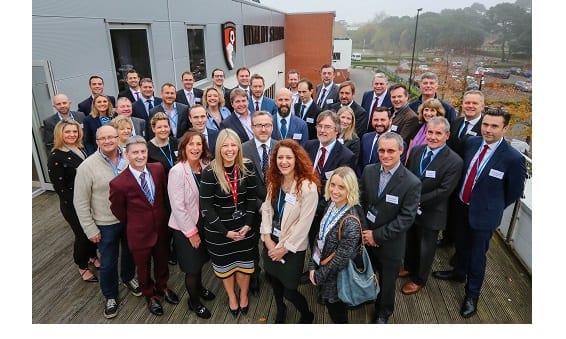DORSET’S economy is a bit like the outline of a plesiosaurus dinosaur – the county has a long tail and a small head.
The memorable comparison, reflecting the population of active businesses across the conurbation and wider Dorset, was made by Professor Nigel Jump, a strategic and analytical economist at Bournemouth University.
He was updating nearly 30 businesses and organisations at the latest Dorset Chamber of Commerce & Industry (DCCI) Business Partner Lunch, held at AFC Bournemouth’s Vitality Stadium, on the economy.
Based on the official data, Professor Jump described the UK economy as still “sluggish and relatively flat” following the Great Recession of 2008-9.
He warned about trade barriers: trade is not a “zero-sum game” and freer trade is in the best interest of global prosperity.
Professor Jump talked about the spread of dynamic businesses across Dorset and how the current environment requires more to be market competitive.
According to sourced figures, there are 14,770 businesses in the BCP area alone, with 191,000 employees.
Professor Jump, picking up on the local coastline’s Jurassic Coast tagline, said: “Dorset needs the right kind of growth, not the wrong kind of growth.
“Our county is like a plesiosaurus dinosaur, with a small head and long tail. We need to grow the head whilst shrinking the tail. We need to do things better, and do better things.”
The local industrial strategy, to be determined over the year or so ahead as part of the government’s wider national industrial strategy, should benefit Dorset through distinct, long-term productivity, growth and innovation, he added.
“We need to co-operate to compete. Ultimately, higher productivity will generate faster growth and raise living standards and well-being.”
Professor Jump’s observations chime with productivity research by Dorset Local Enterprise Partnership (DLEP), which shows that gross value added (GVA) is £28.20 per hour in the DLEP area compared to £32.58 in the UK – an output gap of £2.5 billion compared to the national average.
Innovation and better superfast broadband connections would boost productivity across Dorset, the professor stated.
According to the DLEP research, another 6,000 Dorset businesses need to become innovation active to add around £536 million to GVA.
By the same token improved connectivity adds about £10,400 per annum to business output – and greater take-up in businesses could narrow the output gap by up to £276 million.
Ian Girling is the chief executive of DCCI, which has 700-plus members and is the voice of businesses in Dorset at local, regional and national level.
He said after the event: “DCCI’s events for Business Partners are always thought-provoking and provide insights into how the regional and national economy is doing.
“Nigel’s dinosaur-shape parallel illustrates the challenges the county faces in spreading employment hubs across Dorset, particularly in rural areas.
“We’re grateful to him for sharing his views on what DCCI members, as responsible employers, can do better collectively to punch above our weight on the productivity front.”
Companies and organisations represented at the event included AFC Bournemouth, HSBC, Deep South Media, Sunseeker International, Greendale Construction, Bournemouth & Poole College, Blue Sky Financial Planning, Digital Storm, ITSB, Westover, Global, JP Morgan, Lester Aldridge, DCCI, A One Insurance, PKF Francis Clark, TeamJobs, Poole Harbour Commissioners, ESET, Travel Counsellors for Business, Purple HR, Beales Gourmet at the Italian Villa, Savills (UK), Bournemouth University, Field International, Ouch Training Team and BWT Physio.
